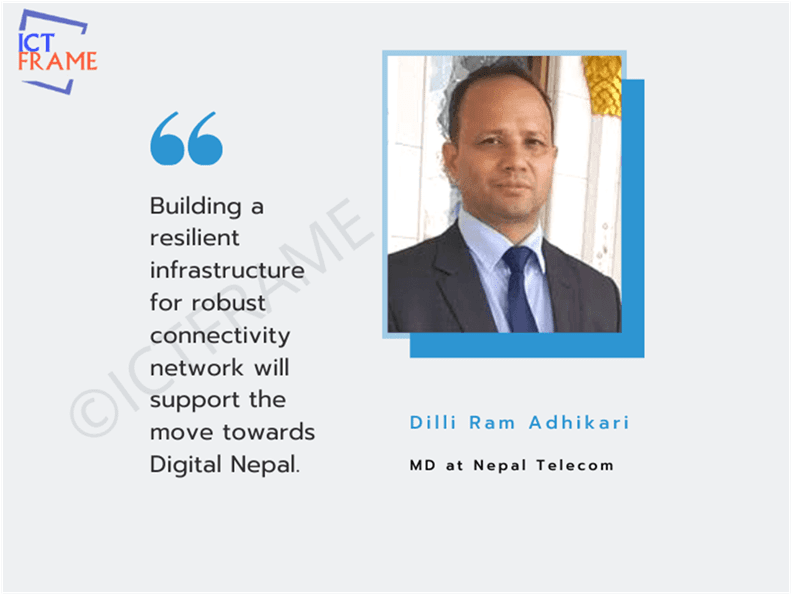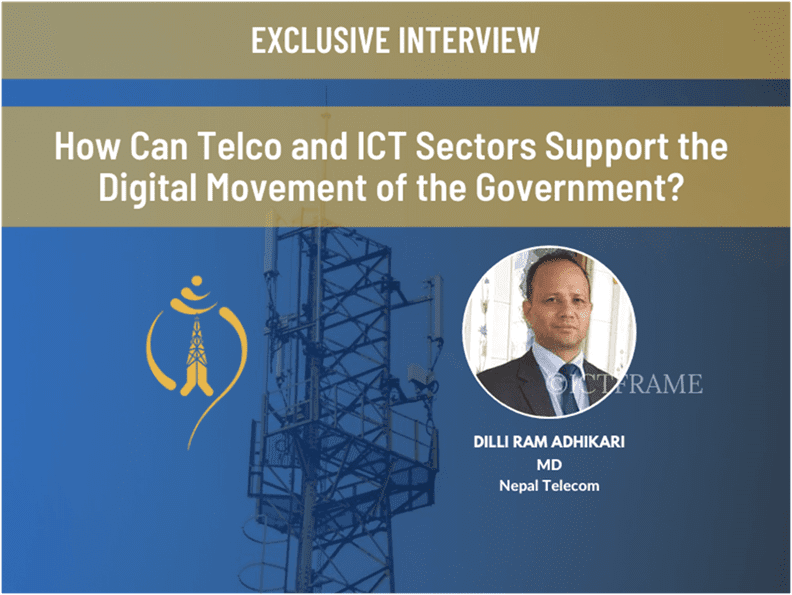The Digital Nepal Movement of the Government, How Can Telco and ICT Sectors Support it?
Kathmandu, 28th April 2020
Nepal is indeed in its digital journey towards Prime Minister KP Sharma Oli’s vision of “Prosperous Nepal, Happy Nepali” with broad objectives. The mobile penetration rate exceeds 100%, while that of the internet reaches 63% in Nepal. Moreover, the stats of 2017 show that every hour, there were 250 new internet users in the country.
[Source: Digital Nepal Framework]
The Digital Nepal Framework has been given a green signal that will enable the nation to harness its growth potential. The telco and ICT sectors have a huge supporting role for the initiative. The country has seen remarkable improvements in the telecommunications sector, and the credit goes to mobile network operators like Nepal Telecom (NTC) and Ncell.
Similarly, digital connectivity plays a vital role that needs immense focus to support the nation’s digital movement. During the lockdown, NTC has introduced several free services as well as cheaper packages with huge bonuses. The company certainly has the tools to boost the economy, which is especially most essential after the lockdown.
You May Also Like: Nepal Telecom Internet Package With Price Details
Let’s get into the topic without wasting any time.
Interview with Dilliram Adhikari – Managing Director at Nepal Telecom
Q. What might be an essential tool for economic boost up after a lengthy lockdown and why?
A: Firstly, the activities of people will get a change in the direction after the lockdown. From the person’s behavior to their effective manner, things might start changing. During such times, the best tool for boosting up the economy is digital technology.
It is essential to digitize activities through connectivity, thereby minimizing mobility. As a result, the events will be cost-effective. Also, it will generate employment opportunities in the digital sector.
The rise in efficiency will result in gaining productivity, as well. Therefore, we will rely more on ICT tools and applications to digitize complete processes. If we can achieve this, it will ultimately boost the economy of every sector.
Q. What might be the essential tools for Telco and ICT sectors for higher productivity and effectiveness?
A: The most important steps that we can take are digitizing and automating the processes. ICT and Telco sectors can minimize the physical workforce through automation. To support this shift, the critical factor is connectivity.
We can introduce concepts of virtual computing by setting up distributed networks. Similarly, to increase productivity and effectiveness, we have to focus on service delivery and dissemination on a wide range. So, the Telco sector can ensure digital connectivity while the ICT sector can contribute to digitizing activities through the application-oriented process.
Q. How can we use 4G and beyond technology for national prosperity?
A: Well, the thing about technology is that its evolution is directly proportional to demand. To fulfill the increasing demand with the development of innovation, high-speed connectivity is required. The high-speed connectivity can be further divided into two types: Fixed and Mobility connectivity.
The evolution of mobile broadband has resulted in technologies like 3G, 4G, and 5G. Currently, 4G technology can carry more business volume and a broad consumer market. That’s why we have implemented 4G technology throughout the nation.
The commercialization of 5G has also started in most countries. 5G supports high connectivity for Machine to machine (M2M) communication and the Internet of Things (IoT) in this industrial era. It can be used to operate applications with low latency.
While it will take some time for 5G to take the market, we are focusing on a mature use of 4G first. Then, we can easily make the shift to 5G. When the technology matures, it cost relatively decreases, and it becomes easier to deploy them. For now, our target is to focus on the maturity of 4G technology, which can fulfill the demand of connectivity in the context of Nepal.
Q. Are 4G and beyond technology affordable for the Nepalese people?
A: Yes, indeed. The higher speed technology will support online education, applications, e-commerce, and businesses. The core purpose of new technology is to increase efficiency in the same spectrum.
Similarly, new technologies address factors like power consumption and compactness. As a result, the deployment will be faster with low space usage, and power consumption will be lesser. Hence, in the case of such technologies, higher throughput will result in the reduction of cost.
For instance, if someone uses 5MB data at a specific price in 4G, they will be able to use the same data pack at a much lower rate in 5G.
You May Also Like: Online Education in Nepal, Are We ‘E-ready’? E-readiness
Q. What is the significant gap for the massive application of online services or e-services from urban sectors to rural sectors?
A: One of the significant gaps of online services is high-speed, reliable connectivity. The same function may be better in urban areas and lacking in rural areas. Another difference can be service affordability – can ordinary citizens afford the services?
These inabilities tie up directly to the economy and the country’s GDP. The Per capita income may be high in urban areas while it is low in rural areas. Similarly, another issue is the unavailability of devices and the inability to purchase them.
In technical terms, it is known as digital poverty. So, these issues create a significant gap of affordability as well, which we have to address. Furthermore, even if these issues are addressed, consumers need to have the skills to operate the devices.
When we move from urban areas to rural areas, we can notice this digital divide. So, we have to address these gaps to ensure minimize the digital divide as well. With this, it will bring a shift in the paradigm of society, industry, and economy.

Q. How can the Telco sector support the Digital Nepal movement of the government?
A: The government has already passed the concept of the Digital Nepal Framework. The Framework address the initiatives to digitally develop sectors like Education, Agriculture, Tourism, Health, etc. To operate these sectors digitally, we will require ICT applications, resilient infrastructure, and a robust connectivity network.
Similarly, we will need to develop the capacity to provide broadband services to every sector and consumers. To run applications, we also require cost-effective solutions. If these things are addressed, we can successfully step forward with the initiatives of the Digital Nepal Framework.
And, the role of telecom for this is to build a resilient infrastructure for robust connectivity network and provide cost-effective broadband services.
You May Also Like: Online Education Initiative By TU & KU | Talks with Telco Industry For Better Infrastructure
Q. Is Nepal Telecom a service-oriented company or a profit-oriented company? How are you planning your business strategy?
A: Nepal Telecom is a state-owned telecommunication service provider, which is also known as “Rastra ko Sanchar.” Therefore, its priority is service, whether it’s profitable or non-profitable areas, accessible or remote areas. This means we have to reach and cover the grounds wherever the citizens of the nation reside.
Furthermore, our services are related to the security of the individual and the nation. For instance, if a problem arises around the nation’s border, the government will be aware of it in no time due to the availability of the network. If there is no network coverage in such areas, then, no news of any activity will get to the government or public.
The telecommunications service has a vital role to play in upgrading the lifestyle of people and developing the nation. Moreover, Nepal Telecom is a company that undertakes business processes. The reason behind this is to manage investment and expenditure for projects.
Similarly, it helps to expand our projects and deliver service to the people. So, our priority is always service even though we run a business. For this, our first strategy after the lockdown will be to digitize our processes.
We will focus on integrating ICT applications, hold online meetings, provide remote support, and work from home. Profit is a secondary aspect, while our primary character remains to disseminate reliable service throughout the nation. For that, our principal strategy will be to implement ‘ABCDE’ or Affordable Broadband Connectivity for Digital Economy.
This means that broadband connectivity should be affordable, and it should boost up the economy as well. For that, we will bring the latest and cost-effective technology, and expand the network coverage.
Q. What are your plans for national employment generation to retain the citizens of Nepal?
A: The deployment of network connectivity and broadband services help all the digital initiatives of the Digital Nepal Framework. Also, these factors contribute to boost the ICT sector and ultimately generate employment opportunities. When the stats of broadband deployment increase, it automatically creates employment.
Nepal Telecom has been responsible for generating employment directly and indirectly. When the company implements and goes forward with its strategies, it automatically creates employment. For instance, we have the responsibility to build infrastructure for optical fiber in hilly areas. Many engineers are working on this project, which means we have generated employment opportunities.
Such projects mostly utilize outsourced workforce on a contract basis, but it certainly has helped to boost employment. Similarly, 400-500 outsourced engineers were working for 4G expansion a few months back. So, we encourage the participation of a skilled workforce through outsourcing, managed services, and cross-sectoral employment.
With this, the ICT sector also sees potential development, which ultimately leads to the expansion of small and medium enterprises. Besides automatically generating employment through projects, it also leverages the overall employment generation process.
Q. Any final words on upcoming plans or suggestions to our readers?
A: Actually, we have just decided on a plan today. We are soon releasing something called ‘e-sikshya package.’ Only students will be able to buy this package with the recommendation of the concerned educational institute. We are releasing cheap data packages to support online education, which is yet to be officially announced.
We have launched several services during the lockdown to continue customer engagement and connectivity. Nepal Telecom is a state-owned company that invests its profit on the development of the nation’s economy and industrial sector. None of our earning or benefits goes outside the country.
Our transactions are transparent, and there are no hidden costs involved. Therefore, I request consumers and tutors to use our service with topmost priority through this platform.
You May Also Like: Nepal Telecom To Help People With Low Balance
Final Say
According to a previous World Bank report, if 10% of the population gain access to broadband internet, GDP would increase by 1.3%. So, the stats are in favor of upgrading the telecommunications sector in the nation. Similarly, it will boost up the economy of the country, which will be a top priority after the lockdown.
The Digital Nepal Framework and its initiative seem very promising. And, all sectors need to play a role in speeding up the process. So, every industry working together can achieve the goal of digital Nepal earlier than expected.
Related Articles
Nepal Telecom Extends Offer On Voice and Data Packs
How Telecoms Industry Can Keep Everyone Connected Amid The Pandemic
Tribhuvan University Issued Guidelines For Teaching Through Online Classes
Fusemachines Launches AI-Enabled Classroom | Will AI Shape the Education Sector?







